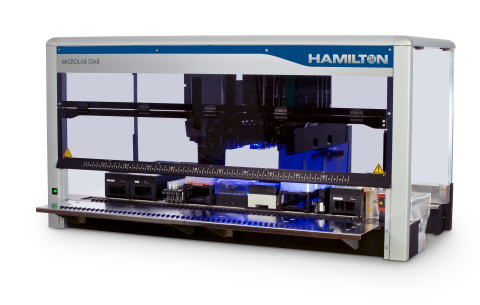Hamilton Company and Rhinostics, an early-stage Harvard University spin-out company, are combining their respective strengths to improve the speed and quality of nasal and nasopharyngeal sample workflows from collection to processing while also reducing the need for active labor involvement. This sample type is widely used to detect antibodies and antigens in relation to the novel coronavirus, SARS-CoV-2 and many other pathogens.
The hands-free automated workflow includes use of the RHINOstic™ nasal swab collection device and one of Hamilton’s Microlab® STAR™, Microlab NIMBUS®, or Microlab Prep™ automated liquid handling workstations, along with the LabElite® DeCapper from Hamilton Storage Technologies. This combination of technologies alleviates common time-consuming bottlenecks in testing workflows, even during times of surging sample influx. By increasing sample throughput and reducing turnaround times, stakeholders are empowered and informed to make confident downstream decisions regarding patient treatment strategies.
The patent-pending RHINOstic nasal and buccal swab collection device consists of a polypropylene swab stick, integrated into an automation-friendly cap, and a transport tube labeled with a 2-dimensional (2D) barcode. At the point of collection, the swab minimizes patient discomfort when gathering sample. Samples collected via the RHINOstic may be shipped without use of viral transport media (VTM) to reduce reagent costs and risks of leaking or aerosol creation. Lack of VTM also eliminates the need to concentrate samples prior to analysis.
Up to 96 samples may be automatically accessioned and decapped at once using the LabElite DeCapper with a 12-channel head and conversion kit. The LabElite DeCapper may be used as a standalone device or integrated with Hamilton’s automated liquid handlers.
Hamilton’s automated liquid handlers consistently and automatically perform tedious and time-consuming pipetting and other tasks so that users may attend to higher value tasks. By reducing active labor time, efficiency and productivity are increased across the laboratory. Walkaway operation also reduces the user’s risk of biohazard exposure.
Each Hamilton automated liquid handler may be optimized with tools and programmed methods for the application at hand, including PCR, next generation sequencing (NGS), ELISA and more. User-friendly software guides any user through assay setup and processing, and when used with Hamilton pipette tips, patented Compressed O-Ring Expansion (CO-RE®) technology creates a tight seal between pipetting mandrel and tip to support highly accurate and consistent results.
Automated sample processing using this hands-free automated workflow from Hamilton and Rhinostics may be easily scaled at any time without increasing labor, equipment or reagent costs.










